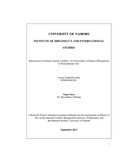| dc.description.abstract | The study analyses remote management as a viable option for principled, effective and accountable humanitarian aid delivery in conflict affected environments. The study was inspired by the changing global security environment and its effect on the growing gap between humanitarian needs and the diminishing safe spaces for humanitarian aid.
The study is guided by the assertion that remote management of humanitarian aid is a product of the theory of obligation, and is centered on one foundational assumption, that there exists a moral imperative to assist the structurally dispossessed and functionally abused, regardless of the contextual risks.
The study employed the use of both qualitative and quantitative methodologies using key informant interviews, focus group discussions and questionnaires. The identification of the respondents was done through a non-probabilistic sample drawn from a cross section of stakeholders in the humanitarian sector including the beneficiaries of the same.
The study set to test the following hypothesis, (i) Remote management does not affect the efficiency and effectiveness of humanitarian aid; (ii) Increased use of remote management increases the efficiency and effectiveness of humanitarian aid; and (iii) Increased used of remote management reduces the efficiency and effectiveness of humanitarian aid.
The study findings confirm both the positive and negative hypothesis, thus
`increased use of remote management both increases and reduces the efficiency and effectiveness of humanitarian aid’. In conclusion, the study acknowledges that remote management programming has the important benefit of allowing humanitarian aid programming to continue in difficult situations with high threat levels, yet the practice entails a number of hazards and disadvantages that contravene good practises in humanitarian aid. | en |

